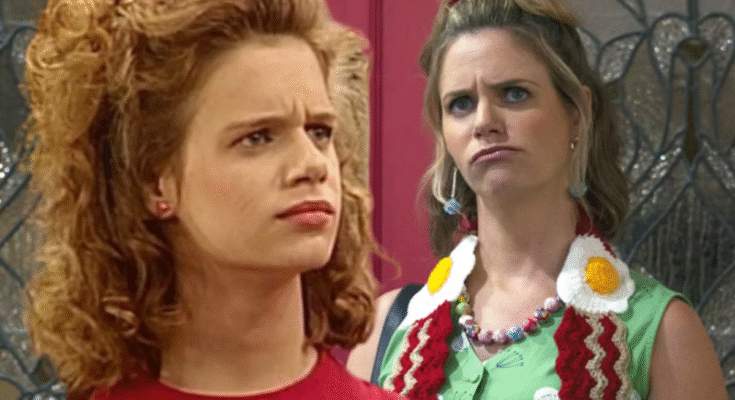How television’s most misunderstood best friend became a symbol of authentic friendship and self-acceptance
Introduction: The Power of Being Unapologetically Yourself
In a world obsessed with fitting in, Kimmy Gibbler stood out like a neon sign in a library—impossible to ignore, often overwhelming, but absolutely essential to the story being told. Portrayed with fearless commitment by Andrea Barber, Kimmy transformed from what could have been a one-dimensional comic relief character into television’s most authentic representation of unconditional friendship and radical self-acceptance.
Kimmy Gibbler didn’t just crash through the Tanner family’s front door—she bulldozed through television conventions about what a “best friend” character should be. She was loud when she should have been quiet, inappropriate when she should have been polite, and persistently present when others might have taken the hint to leave. Yet somehow, through eight seasons of Full House and the continuation in Fuller House, Kimmy proved that the most annoying person in the room can also be the most loyal, and that true friendship isn’t about compatibility—it’s about commitment.
Her journey from the eccentric teenager who made everyone slightly uncomfortable to the confident adult who embraced her quirks while building a successful life represents one of television’s most underrated character development arcs. Kimmy Gibbler taught generations of viewers that being different isn’t a flaw to overcome—it’s a strength to celebrate.
Chapter 1: Origins of an Original
The Gibbler Difference
Kimmy Gibbler’s introduction to the Full House universe immediately established her as something the Tanner household had never encountered before: controlled chaos in human form. While the Tanners represented stability, routine, and emotional support, Kimmy brought unpredictability, spontaneity, and a complete disregard for social conventions.
Her family background, though rarely explored in depth, painted a picture of a household that operated by entirely different rules than the Tanner home. Where Danny Tanner provided structure and emotional guidance, the Gibbler parents seemed to embrace a philosophy of benign neglect mixed with eccentric acceptance. This upbringing explained much about Kimmy’s fearless approach to life and her inability to recognize when she was being socially inappropriate.

The contrast between the two households wasn’t presented as a judgment about better or worse parenting—instead, it highlighted how different environments can produce equally valuable but distinctly different personalities. Kimmy’s chaos wasn’t the result of poor upbringing; it was simply a different way of moving through the world.
Finding Her True Family
The Tanner household became Kimmy’s emotional anchor in ways that weren’t always explicitly stated but were consistently demonstrated through her actions. She didn’t just visit DJ; she inhabited the Tanner home as if she belonged there—because, in all the ways that mattered, she did.
Danny Tanner’s initial bewilderment at Kimmy’s presence gradually evolved into grudging acceptance and eventually genuine affection. His protective instincts, so finely tuned to his own daughters’ needs, slowly extended to include this strange, loyal girl who had somehow become part of their family ecosystem.
Joey and Jesse’s relationships with Kimmy revealed different aspects of her personality. Joey’s childlike humor found a kindred spirit in Kimmy’s uninhibited approach to life, while Jesse’s initial annoyance with her eventually gave way to respect for her unshakeable loyalty to DJ. These relationships showed that Kimmy wasn’t just tolerated by the Tanner men—she was valued for the unique perspective she brought to their family dynamic.
Chapter 2: The Art of Unlikely Friendship
Complementary Opposites
The friendship between DJ and Kimmy shouldn’t have worked. DJ was responsible, mature, and concerned with maintaining social harmony. Kimmy was impulsive, childlike, and seemingly oblivious to social cues. Yet their bond became one of television’s most authentic portrayals of how real friendships often thrive on differences rather than similarities.
DJ provided Kimmy with the stability and emotional grounding that was missing from her own family environment. In return, Kimmy offered DJ permission to be silly, spontaneous, and occasionally irresponsible. Their dynamic demonstrated that the best friendships often involve people who help each other access parts of themselves they might not otherwise explore.
The challenges in their relationship were as important as the harmony. DJ’s occasional embarrassment at Kimmy’s behavior, and Kimmy’s hurt feelings when she sensed disapproval, created realistic friction that made their bond feel genuine rather than idealized. These conflicts, always resolved through honest communication and mutual forgiveness, modeled healthy relationship skills for viewers.

Loyalty Beyond Logic
Kimmy’s loyalty to DJ transcended rational explanation. She defended DJ against critics, supported her through romantic disasters, and remained present during family crises without being asked. This unwavering commitment, delivered without expectation of reciprocal gestures, represented pure friendship in its most selfless form.
What made Kimmy’s loyalty particularly powerful was its unconditional nature. She didn’t support DJ because DJ was always right or always kind to her—she supported DJ because that’s what love looks like in action. Her friendship offered a masterclass in showing up for people not because they deserve it in any given moment, but because the relationship itself is valuable enough to weather temporary storms.
This loyalty extended beyond DJ to encompass the entire Tanner family. Kimmy became a protective force around the people she loved, using her natural fearlessness to defend them when necessary and her humor to lighten their burdens when possible.
Chapter 3: Growing Into Herself
The Awkward Years
Kimmy’s teenage years in Full House showcased the particular challenges faced by young people who don’t fit conventional social molds. Her loud clothing choices, unusual interests, and social awkwardness made her a target for judgment, yet she persisted in being authentically herself despite the social costs.
Her romantic relationships during this period were often portrayed with gentle humor, but they also revealed her vulnerability and desire for acceptance. Kimmy’s crushes and dating experiences showed that beneath her confident exterior lived a teenager who wondered if anyone could love her exactly as she was—quirks and all.
The show’s treatment of Kimmy’s adolescent struggles was remarkably progressive for its time. Rather than suggesting she needed to change to be more acceptable, the narrative consistently reinforced that the problem lay with others’ inability to appreciate her unique qualities. This message of self-acceptance was particularly powerful for young viewers who saw themselves reflected in Kimmy’s experience of being different.
Learning to Channel Chaos

As Kimmy matured through the series, her character development involved learning to harness her natural energy and enthusiasm in more constructive ways without losing her essential spark. She began to understand social cues better and developed greater emotional intelligence while maintaining her distinctive personality.
This growth wasn’t about becoming a different person—it was about becoming a more skilled version of herself. Kimmy learned to read situations more accurately and adjust her approach accordingly, but she never tried to become someone she wasn’t. Her journey modeled healthy personal development that honored authentic self while building better interpersonal skills.
The show’s approach to Kimmy’s maturation process sent an important message about personal growth: change should enhance your authentic self rather than replace it. Kimmy’s evolution demonstrated that self-improvement and self-acceptance aren’t mutually exclusive concepts.
Chapter 4: Fuller House – The Woman She Became
Motherhood and Maturity
Fuller House revealed a Kimmy who had successfully navigated the transition from eccentric teenager to responsible adult without sacrificing her essential nature. As a mother to Ramona, Kimmy demonstrated that her childhood experiences of feeling different had given her unique tools for supporting a daughter facing her own identity challenges.
Her parenting style reflected her core values: acceptance, loyalty, and the courage to be different. Kimmy’s relationship with Ramona showed how her own struggles with fitting in had prepared her to guide her daughter through similar challenges with wisdom and understanding.
The evolution of Kimmy into a successful businesswoman surprised some viewers but made perfect sense for the character. Her entrepreneurial success demonstrated that the same qualities that made her seem “weird” as a teenager—creativity, fearlessness, willingness to take risks—were actually valuable assets in the adult world.
Supporting the Next Generation

Kimmy’s role in Fuller House as part of DJ’s support system showcased how her loyalty had matured into practical, meaningful assistance. She moved in to help DJ raise her children not out of pity or obligation, but because that’s what family does for family. Her presence provided DJ with both practical help and emotional support during one of the most challenging periods of her life.
Her relationships with DJ’s children revealed new facets of her personality. Kimmy’s natural playfulness made her an excellent aunt figure, while her own experiences as an outsider helped her connect with any of DJ’s kids who struggled with fitting in. She became a bridge between the responsible adult world and the freedom of childhood imagination.
The dynamic between adult Kimmy, DJ, and Stephanie created a powerful trio of women supporting each other through the challenges of modern life. Kimmy’s contribution to this partnership was uniquely hers: unfiltered honesty, unwavering loyalty, and the ability to find humor in even the most stressful situations.
Chapter 5: Cultural Impact and Lasting Legacy
Redefining the Best Friend Archetype
Kimmy Gibbler revolutionized the television best friend role by refusing to be relegated to the background. Unlike many sitcom sidekicks who existed primarily to support the main character’s storylines, Kimmy had her own arc, her own growth, and her own important place in the family structure.
Her character challenged the notion that best friends need to be similar or conventionally appealing. Kimmy showed that the most valuable friends are often the ones who see the world differently, who challenge you to step outside your comfort zone, and who love you unconditionally even when you’re not at your best.
The longevity of Kimmy’s character across multiple decades demonstrated that audiences hunger for authentic representation of different personality types. Her popularity proved that viewers connect with characters who feel real and flawed rather than idealized and perfect.
Representation and Acceptance
For viewers who felt like outsiders in their own social circles, Kimmy Gibbler provided crucial representation. She showed that being different doesn’t mean being wrong, that social awkwardness doesn’t disqualify you from meaningful relationships, and that persistence and loyalty are more valuable than popularity.

Her character arc sent a particularly powerful message to young people struggling with self-acceptance. Kimmy’s journey from insecure teenager seeking approval to confident adult comfortable in her own skin provided a roadmap for embracing individuality while building meaningful connections with others.
The show’s consistent portrayal of Kimmy as valued and loved by her chosen family, despite her quirks, modeled healthy relationship dynamics that many viewers carried into their own lives. Her character taught that true acceptance involves loving people because of their differences, not despite them.
Influence on Modern Media
Kimmy’s success paved the way for other unconventional characters to become central figures in family entertainment. Her example showed that audiences were ready for more diverse personality types in leading roles, opening doors for characters who might have been relegated to occasional comic relief in earlier eras.
The authenticity of Andrea Barber’s portrayal created a template for how to play quirky characters with depth and dignity. Kimmy was never the butt of cruel jokes; her humor came from genuine personality traits rather than mean-spirited mockery.
Her character’s evolution across two series demonstrated the value of long-form character development, showing how even the most seemingly one-dimensional characters can reveal depth and complexity when given the opportunity to grow.
Conclusion: The Enduring Power of Authentic Friendship
Kimmy Gibbler’s journey from intrusive neighbor to beloved family member represents more than character development—it exemplifies the transformative power of unconditional acceptance and genuine friendship. Her story reminds us that the most meaningful relationships often begin with the most unlikely connections.
Through her unwavering loyalty to DJ and the Tanner family, Kimmy demonstrated that love isn’t about finding someone who fits perfectly into your life—it’s about making room for someone who makes your life more interesting, more challenging, and ultimately more complete. Her presence in the Tanner household proved that families aren’t just created by blood or marriage; they’re built by choice, commitment, and the willingness to embrace each other’s imperfections.
Kimmy’s evolution from eccentric teenager to confident adult showed that personal growth doesn’t require abandoning your authentic self. Instead, it involves learning to express your true nature in ways that honor both your own needs and your relationships with others. Her journey offered hope to anyone who has ever felt too different, too loud, or too much for the world around them.
Perhaps most importantly, Kimmy Gibbler taught us that the person who annoys you most might also be the person who loves you best. Her relationship with DJ proved that true friendship can weather embarrassment, survive conflicts, and grow stronger through challenges. In a world that often prizes surface-level compatibility over deep commitment, Kimmy’s loyalty stands as a testament to the enduring value of showing up for the people you love, regardless of convenience or social pressure.
The legacy of Kimmy Gibbler lives on in every friendship that chooses depth over ease, authenticity over approval, and loyalty over convenience. She reminded us that being yourself—fully, unapologetically, and consistently—isn’t just acceptable; it’s necessary. In a character who could have been dismissed as merely annoying, we found one of television’s most profound lessons about love, acceptance, and the courage required to remain true to yourself while building meaningful connections with others.
Kimmy Gibbler may have been the most unlikely heart of Full House, but she proved that sometimes the most unlikely hearts beat the strongest.
Discover more stories of authentic friendship and personal growth at StarConnect Network, where genuine connections meet meaningful storytelling.



